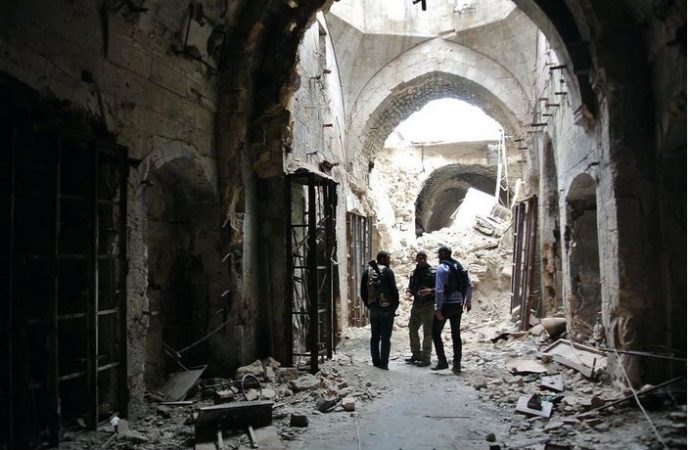
By Inés San Martín
SANTA FE, Argentina (Crux) – Four out of the five Franciscan friars working in the war-torn Syrian city of Aleppo tested positive for COVID-19, with two of them dying from the disease.
The information was sent to Crux by Father Ibrahim Alsabagh, the parish priest of the Latin Parish in Aleppo. He claimed the high percentage of cases – four out of five – was similar throughout the parish, although Crux could not independently verify these numbers.
“We have been marked by this virus more strongly than you have experienced in other European countries and elsewhere,” he said. “Also due to the precariousness and lack of hospitals, medicines, doctors and nurses … the lack of experts in the field and gifted people who can tell people what to do and what not to do, through laws that guide behavior and action.”
In a letter to Crux dated Sept. 14, Fr. Alsabagh notes that he’d been the only friar not affected by the virus, and he considered it a “providence,” as it allowed him to care for the two who survived, as well as keep the parish up and running.
The priest also noted that the Syrian government has not implement a nationwide quarantine or lockdown to try to slow down the spread of the new coronavirus that’s responsible for over 936,000 deaths worldwide. Fr. Alsabagh said the parish tried to inform people about social distancing at a community level to avoid a larger catastrophe.
Official numbers put the death toll for the virus in Syria at a relatively low level: Only 160 reported fatalities. However, the United Nations warned in late August that cases and deaths were being severely underreported, and that the transmission of COVID-19 was “widespread” in the country with an extremely fragile health system due to a decade-long civil war.
“To fully understand the precarious situation of treatment and prevention, it is enough to say that for several days we have buried ten Christians a day who died from the virus,” Fr. Alsabagh told Crux. “If we generalize the number, it turns out that in Aleppo, inhabited by 2.5 million, there were 833 people a day. The very high number when compared with figures from other parts of the world gives you an idea of what challenge we face in the city.”
Hospital bills are almost impossible to pay, with reports of people having to sell their homes to pay for a few days in an intensive care unit.
“Personally, I did not expect this stage of the Via Crucis, and I never imagined living it, as a parish priest in the ‘rubble city’ of Aleppo,” the priest said, noting that when he first arrived in the city, he prepared himself for “missiles, lack of water and food, but never, on top of all this, a pandemic.”
The picture Fr. Alsabagh paints is a grim one. Scorching heat, no fuel for the generators for electricity: “During the night, one is boiled with one’s sweat.” There’s little hope for a restful night of sleep, he said, making it hard to regain the strength for the following day.
The scarcity of fuel is made worse, he said, by international sanctions, which has also affected the food supply. Hundreds line up for bread every morning.
When the parish first suggested social distancing and wearing a face mask to the faithful, Fr. Alsabagh wrote, people “laughed,” pointing towards the daily lines in front of the bakeries.
In addition to the pandemic, the cost of living continues to grow in an “unimaginable and ‘unreal’ way,” with people becoming poorer by the day as the gap between pay and the price of basic necessities continues to grow.
“In addition to all this, we have more than nine accumulated years of war on our shoulders, which have left human wounds never healed from all points of view,” Fr. Alsabagh wrote in the letter, titled “A scream from Syria.”
Yet, despite the “battlefield” in which they’ve been called to minister, the Franciscan friars in Aleppo “continue the spiritual accompaniment to our people, in a personal way and in a community way, using the means of communication and spending hours and hours a day on the telephone, asking our parishioners about their situation.”
Added to spiritual assistance, the parish has given material support to thousands, distributing food, footing hospital bills, handing toiletries, and helping people prepare to heat their homes during the upcoming winter.
Those who live in Aleppo, he said, “carry many crosses on their shoulders,” which leave a mark on the hearts.
“These crosses condition our life, our eating, movement and sleep in the objective way,” Fr. Alsabagh wrote.
“We are blessed then, when we welcome these crosses and live them by offering them for the love of the Lord and our siblings. It’s very beautiful, in fact, when the cross is not experienced in a personal way, but shared with others, where we carry our crosses with the support of others and supporting others [to carry theirs],” he said.
